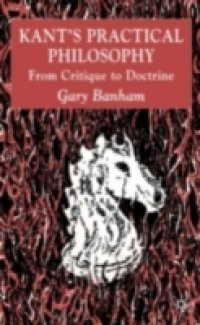The whole range of Kan't philosophy is examined in this book. Unlike the majority of studies, this work traces the evolution of Kant's practical concerns from his 'pre-critical' works to the culminating Metaphysics of Morals and argues for a remarkable continuity in Kant's treatment. In demonstrating Kant's commitment to a material understanding of ethics, Gary Banham cogently argues that they have to be understood as teleological and perfectionist. Tracing in detail the connection between Kant's critique of morality and his account of rational religion provides a new setting for Kant's treatment of evil. In distinguishing Kant's critical works from his doctrinal ones, this study sets out the importance of Kant's accounts of property, right and virtue. Providing a comprehensive treatment of Kant's enquiries, Banham shows the extent of Kant's creative engagement with tradition and challenges the reception of his work current in moral philosophy and political theory.

